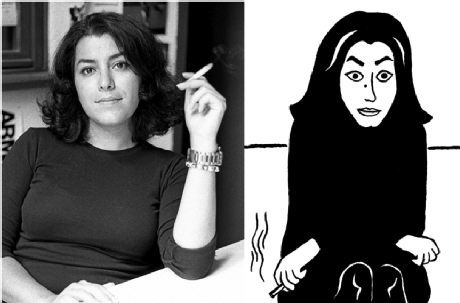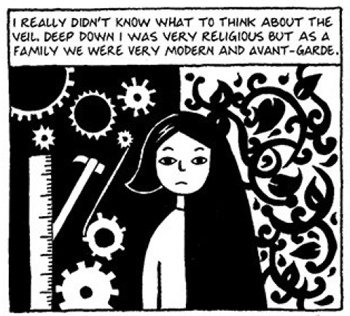Introduction to Persepolis
Where do you come from?
Satrapi’s Persepolis is a French graphic novel that tells the story of Marjane’s childhood in Iran during the Islamic revolution. The novel displays issues associated with gender, individual identity, national identity, and the war. Part 1 of the novel describes the challenges faced by Iran, as a nation, and Marjane’s naïve perspective reveals a simplified understanding of Iran’s political past. Part 2 of the novel is a turning point for Marjane, as she is forced to leave her country and move to a safe haven, Vienna. Overwhelmed by the tremendous choice and availability of food and other products in supermarkets as well as the freedom of Viennese culture, she begins to slowly adapt to the life of the locals. Although language being a strong barrier to full integration, Marjane is sent to a French speaking school, The Lyceum of Vienna, where she obtains her middle school education. Moving from a boarding house run by nuns, to a friend’s house, to a communal apartment with eight gay men and finally, to a room in Frau Heller’s house, Marjane faces a lot of acceptance from the community, as well as racism, which only serves to remind her of the outsider that she is, and always will be. After spending four years in Vienna, Marjane returns to her hometown, Tehran. Having been in the West for so long, Marjane does not feel accustomed to the strict regulations of her country, in particular the necessity of the veil. Thus she begins to understand her oppression and it is almost as if she has been delocalized, or too westernized to feel at home. After attempting to adjust back to the system through seeing her old friends, dating a boy, and going to university, Marjane realizes that indeed, she feels like she does not belong, and is yet again an outsider, but this time in what is supposedly her own country. Thus Persepolis presents not only a childhood but also Marjane’s inability to identify herself with one place in the world, and it is the pressure of fitting in combined with oppression, that ultimately leads to her leaving her country behind for good.


Interview
“Where do you come from?
I am French. For an Iranian, it’s a one-hour explanation: I am Iranian but, I am Iranian but…
How do you answer that question now, as opposed to when you were young?
When you are young you hate to answer that question. Well, today I just say “I am Iranian,” and they say “You are Iranian?” and I say “Yes, it is a fact, I am Iranian. I was born there, I have black hair. Yes, I am an Iranian person, what can I do?” Since writing the book, nobody can tell me “Give me some explanation. “I think now my explanation is just “Read the book and you’ll see.
So do you think the definition of feminism is to define that women are better than men?
That is what I feel. When they talk about “The men ruined this, the men did that,” it is a person, and their sex comes after what they’ve done. I believe that we say too much “We the women” and “We the men,” but should say “We the human beings.” There are really two types of human being -- the ones who care about environment, who want a more just society; and the other ones who care about greed and war. So it’s not a question of East and West, and American and Iranian, and women and men.” (Tully)
“Speaking of accents and language — what language do you write and create in?
I speak six languages (including Farsi, Swedish, German and Italian), but I have always written in French. Almost all my scholarship was in French schools. When I started drawing, I worked in French. I tried to write in English, but it’s a matter of a way of thinking — and of words that don’t exist in other languages. The French don’t have a word for “fun.” French people have “irony,” but not fun — you have to use the English word.” (Cavna)
“Do you think it was important to tell this story from a political standpoint at this time right now?
I don't think it is a political standpoint. On the contrary, I think it's extremely humanistic. It's a human point of view. The politic is in the background, because the politic is in the background of everything. Just see today, today every movie that is made about teenagers or about the subject of abortion, for example. You don't have one single movie that says abortion is a good idea, which people they have been fighting for that, to be able to have the abortion. You don't have one single movie that shows that is a possibility. And in all the movies, it's not a good idea and at the end the girl has the baby and it's very nice. Why? Because we are living in a very conservative time. You don't see the politic directly in this movie, but there are politics in this movie.
For me, these are neo-conservative movies that go with the religious culture, being against liberalism, to condemn women that make abortion. This is very political without showing it. I show honestly, the politic that is in the background, because you have to situate your story somewhere. And at the same time I make it in animation, because the drawing is more abstract and it can be anywhere and it can be anyone, because of this abstraction.
You touched on this briefly, but in that whole realm, can you explain why you chose to go with black and white?
Well, you know, [Vincent Paronnaud] and I, both of us, we come from underground comics, in which for economical reason, you work in black and white. Because printing in black and white costs less than in color. So this is something we're used to. Plus that is an aesthetical point of view, because I really love the aesthetic of black and white, whether it be for movies or for photos or whatever, I like that. So it was an obvious choice. I'm not a black and white freak, but you know...
I was also going to ask, how strictly does it follow your own life story?
That is my own experiences and it's based on that, and what is true and what is not true? Who cares! I'm not here to say this is the story of my life and give me the money because I am this nice girl. I say this is a story of this girl who called Marjane and I have never pretended the contrary of that. We're not making an interview on 60 Minutes about me. This is just based on my own experiences and then what is true and what is not true and what I did and what I did not, this is own my own secret, of course I will not say it to you. It's like asking a chef give me the recipe of your food. Of course I won't give it to you, then you will go out and make the same thing about your childhood in Denver. And that will be the end of my business, I won't do it!” (Billington)
Works Cited
Billington, Alex. "Discussing Persepolis with Writer and Director Marjane Satrapi." First Showing. N.p., 14 Jan. 2008. Web. 23 May 2013.
Cavna, Michael. "THE COMIC RIFFS INTERVIEW: ‘Persepolis’s MARJANE SATRAPI Comes Not to Bury American Culture but to (mostly) Praise It [*even If Modern Hollywood Is Incapable of ‘Casablanca’]." Washington Post. The Washington Post, 27 Apr. 2012. Web. 23 May 2013.
Tully, Anny. "AN INTERVIEW WITH MARJANE SATRAPI." Bookslut. N.p., Oct. 2004. Web. 23 May 2013.
Image 1 URL http://www.djc.com/stories/images/20080411/Marjane_Satrapi_big.jpg
Image 2 URL http://farm6.static.flickr.com/5264/5809514701_3a66e3cec3.jpg
